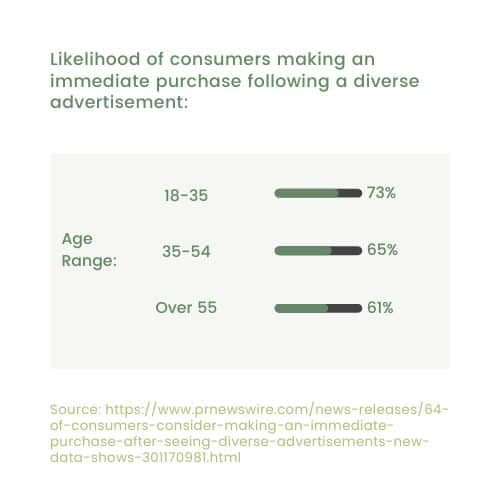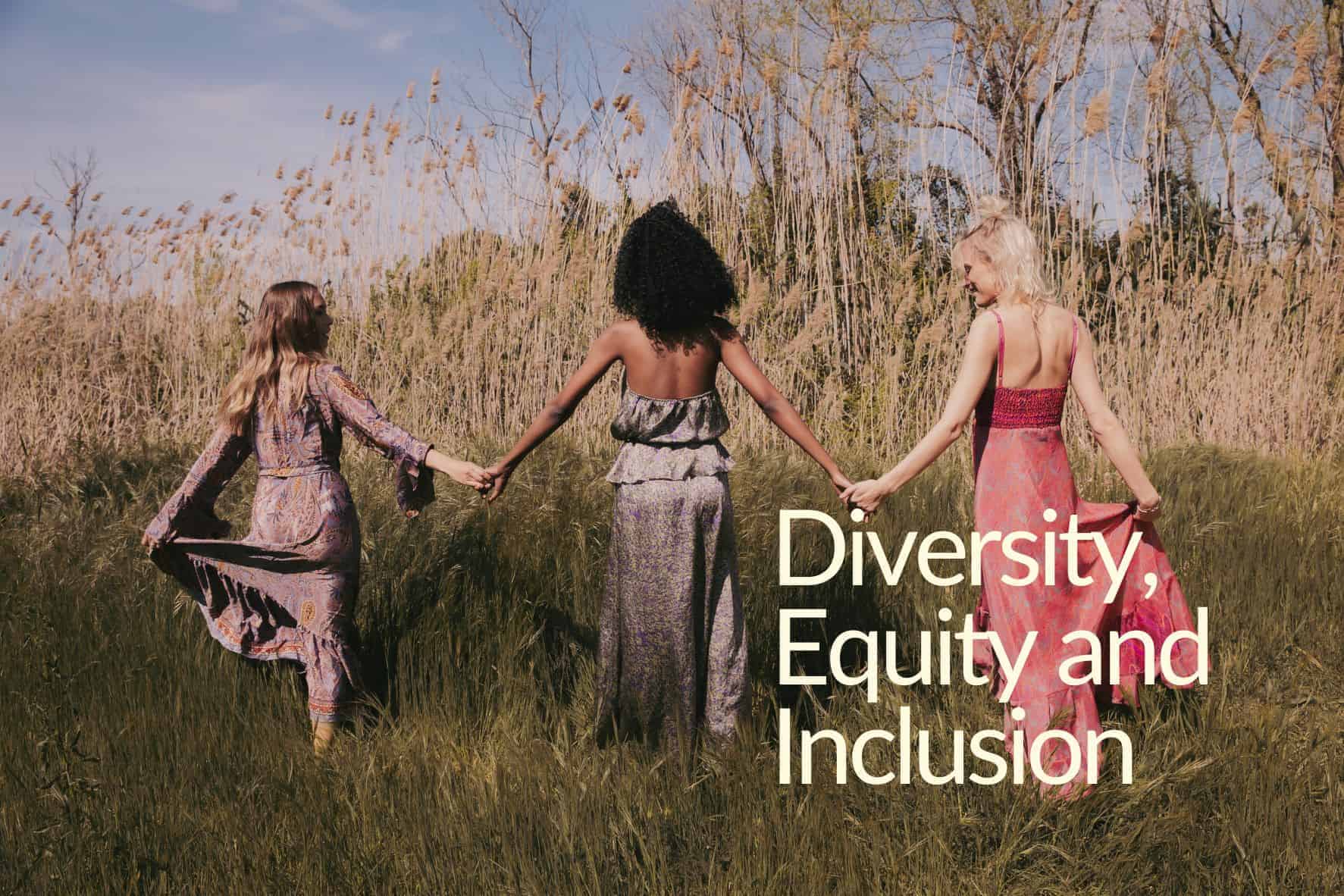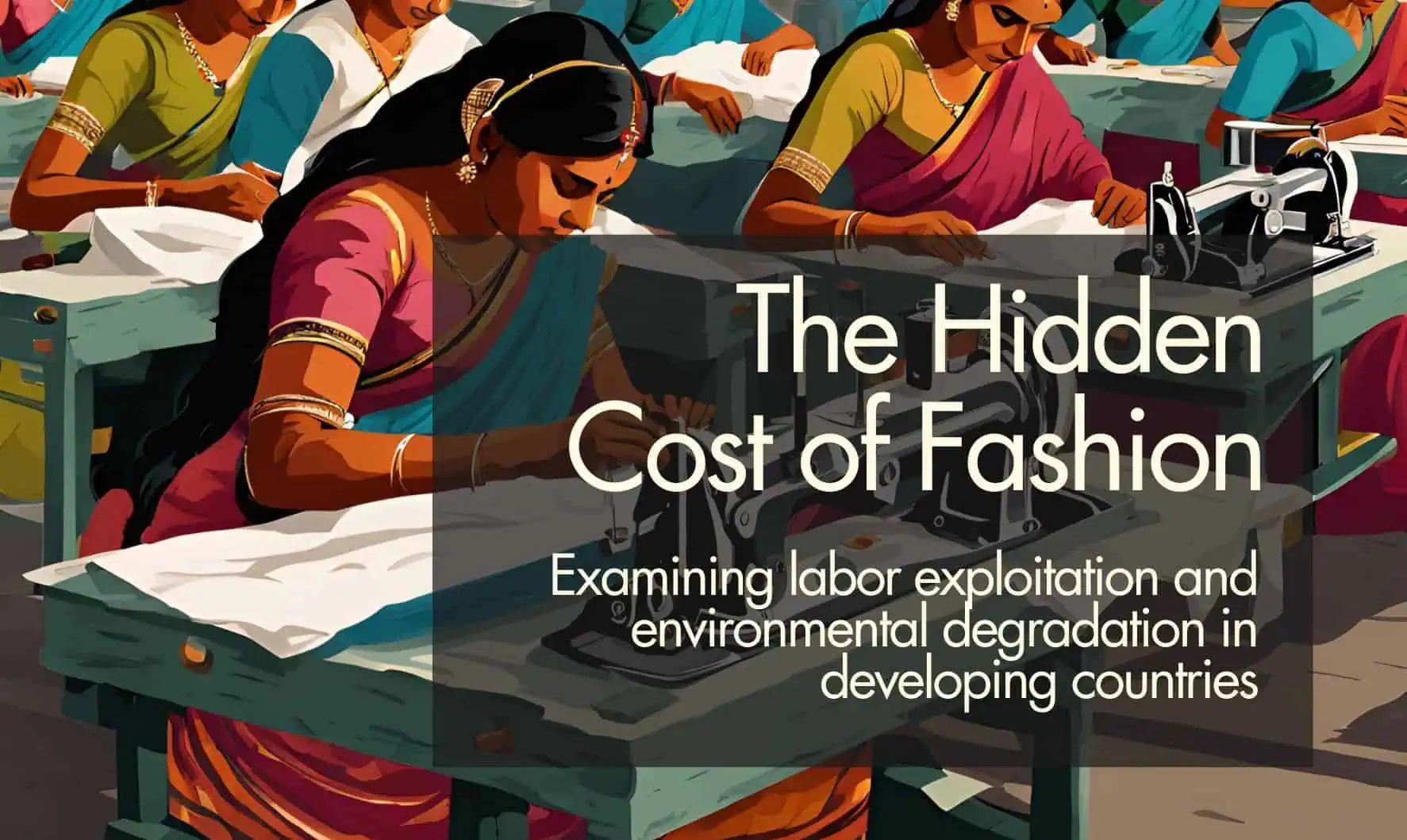Fashion and exclusivity are concepts that tend to go hand and hand. So, is it possible for sustainable fashion to prioritize diversity, equity and inclusion (DEI)?
In this article, we’ll explore:
- Consumers’ relationships with brands that support DEI
- Why Social Responsibility has become a key factor for most investors
- How diversity can lead to more market opportunities
- The possible legal and public backlash that brands can face if they ignore DEI
- Why reputable certifications require consideration to DEI
Historically, exclusivity has often been associated with a narrow and homogeneous group of consumers. Luxury fashion brands typically lead the charge with exclusivity, catering primarily to wealthy, Eurocentric customers.
But can sustainable and ethical fashion brands really be “exclusive”? The short answer is no. Brands need to embrace concepts such as Diversity, Equity, and Inclusion (DEI) within their DNA to partake in this space.
Within fashion, there’s an overwhelming lack of representation of DEI at executive levels within brands and groups advocating for sustainable fashion.
Ignoring DEI isn’t just outdated, it can be downright damaging. It’s damaging to fashion brands’ reputations and the people who work hard to contribute to this industry. So how does this show up? We see it with limited representation of people of color, different body types, and other marginalized groups in advertising, editorial content, and runway shows.
Fashion should be leading trends, not lagging behind them
As a woman of color, it’s rare to see people that look like me represented on boards or talks about sustainable fashion. It’s predominantly white men or women. This is contrary to the fact that most talks centered around sustainable fashion or climate change don’t shy away from the fact that the people most impacted by climate change are disproportionately women of color.
It’s time to stop tip-toeing around the issue and address why it’s important for brands to consider DEI as an integral component of their operations.
Here are 5 reasons why fashion brands need to consider DEI:
1. Build brand loyalty and enhance brand reputation
Consumers want to support brands that align with their values. A fashion brand that prioritizes DEI is positioned to build stronger brand loyalty.
A 2022 report from McKinsey about the “The Rise of the Inclusive Consumer” states that 2 out of 3 American consumers are basing their shopping choices around their social values. This shift in shopping behavior reaches across age and racial lines.
Diverse advertisements can also increase sales. According to a recent report, 64% of consumers are more likely to make an immediate purchase after seeing an ad that showcases diversity.

By representing a range of people and perspectives, DEI creates a sense of inclusivity which helps enhance a brand’s reputation. This helps sustainable fashion brands stand out in a crowded marketplace.
2. Demonstrate Social Responsibility to investors and stakeholders
Environmental, Social and Governance (ESG) criteria have become increasingly important over the past 5 years by investors, and stakeholders that make decisions about partnerships and funding.
Fashion brands that want to authentically showcase and demonstrate their values need to pay attention to the Social Responsibility component of ESG. Within the fashion industry, Social Responsibility can encompass a range of issues, including labor rights, worker safety, diversity and inclusion, ethical sourcing, and sustainable production methods.
Sustainable fashion brands that prioritize Social Responsibility help to demonstrate their commitment to ethical and sustainable practices, which in turn attracts and retains customers and makes their business more appealing to investment opportunities. Industry-wide, fashion brands that promote and adhere to positive social impacts, help to foster greater accountability and transparency, which is desperately needed in fashion.
By prioritizing Social Responsibility, a fashion brand can position itself as a leader and appeal to a larger audience. This 2021 report on Corporate Social Responsibility by the Harvard Business School states that “Seventy-seven percent of consumers are motivated to purchase from companies committed to making the world a better place”.
3. Attract diverse talent and open more market opportunities
By prioritizing DEI, fashion brands create a more inclusive workplace culture. This helps to attract and retain a diverse range of employees with different backgrounds, experiences, and perspectives.
It can be tough for small fashion brands to have a diverse workforce. Tiny teams can mean a stronger likelihood that founders will hire people who look at and experience the world similarly to them. This is known as unconscious bias.
Unconscious biases are learned assumptions, beliefs, or attitudes that we’re not aware of. These biases can reinforce stereotypes and prevent us from fairly and accurately assessing people, experiences, and the world at large.
Research shows that the best way to overcome unconscious bias is to learn more about them. This document from Toronto Metropolitan University breaks down various types of bias that occur and how to counteract them including:
- Normative bias – preference for people on similar career paths
- Performance bias – overestimating people from “high status groups”
- Maternal bias – doubting people’s ability for a job based on age, gender, race, etc.
Learning more about and overcoming unconscious bias can open up more opportunities for fashion brands. In fashion, the old adage “it’s not what you know, but who you know” rings very true. Canada has thousands of fashion manufacturers; however, we don’t natively have vast textile sourcing options. By casting a wider net to international markets, brands can access new and innovative fabric options including recycled materials.
Statistics Canada reports that in 2020, 35% of all manufactured Canadian clothing (approximately $6.5 billion CAD) was exported. Canadian fashion was mostly exported to the United States, Mexico, Japan, China, and the UK. By learning about other countries, their unique needs, and forming meaningful relationships, more market opportunities can become available. In an interview with Export Development Canada, Bob Berger of Ontario’s MW Canada had the following to say:
“Canada has a good reputation for unique and quality products around the world,” Berger said. “That being said, customers don’t care where they buy from. Quality, service, price, delivery – they want it all. If you want to be successful in the global marketplace, you have to be ahead of the game and never be happy with what you have. If you stay the same, you fall behind – you’ll be gone.”
The fashion industry caters to a diverse customer base, and having a workforce that reflects this diversity can help brands better understand and serve their customers. A more diverse workforce can bring different perspectives, ideas, and experiences to the table, which can lead to greater innovation and creativity in product design, marketing, and branding.
If you want to learn more about your own unconscious biases, Harvard has put together a series of tests you can try out here: https://implicit.harvard.edu/implicit/takeatest.html

4. Meet industry standards and avoid legal and public backlash
The fashion industry is increasingly recognizing the importance of DEI. Brands that fail to prioritize it may be at a disadvantage in terms of meeting industry standards and best practices.
As evidenced by changing legislation, the fashion industry is under a close lens and needs to pay particular attention to any claims it advertises.
Claims of being sustainable and ethical can potentially open a brand up to legal repercussions and fines if it can’t be proved how these criteria are being met. Failing to prioritize DEI can also expose a brand to legal risks including discrimination lawsuits.
By having diverse representation throughout their staff, fashion brands can ensure cultural sensitivities are acknowledged and don’t lead to embarrassing, and harmful situations. This Fashion United article from 2021 highlights several recent examples of cultural appropriation within the industry:
- In 2020 Isabel Marant was accused of appropriating Mexican indigenous designs
- Louis Vuitton was criticized in 2021 for selling a scarf inspired by the Palestinian keffiyeh
- In 1994 Karl Lagerfeld used a verse from the Koran as a print
It’s understandable that fashion brands might want to draw inspiration from other cultures. But it’s perplexing when a brand doesn’t employ staff or consult others from affected cultures when they become an integral part of their designs. If there was adequate representation, and people were empowered to speak up, brands would understand how insulting it is to culturally appropriate important cultural and religious objects.
It’s also completely inexcusable when the appropriated designs are racist in nature.
Public opinion is also extremely important to the continued positive growth of fashion brands. Not prioritizing DEI, can give the impression that the brand is not committed to creating an inclusive and equitable workplace, which can negatively impact its reputation and brand image.
Consumers are becoming more aware of social and environmental issues, and are increasingly seeking out brands that align with their values. If a brand is seen as not valuing DEI, it risks losing customers and potential investors.
5. Qualify for sustainable certification
Fashion brands interested in continuing to market themselves as sustainable or ethical will need to invest in third-party certification. Changing legislation in the US and the EU demonstrates a shift in greenwashing attitudes, where claims will need to be backed up or result in significant fines and possible legal action. It is logical to conclude the same will happen in Canada.
For example, In Toronto, Julie Segal the Senior Manager, Environmental Defence called on all levels of government to act on false or unsubstantiated sustainability claims.
Third-party certification is important because it provides a way for consumers to trust the environmental or social claims made by companies. When companies self-certify, there is a conflict of interest, and consumers have no way to verify the accuracy of the claims.
Most reputable certification bodies will holistically examine a brand’s strategy and operations, to ensure it’s aligned and working toward a well-defined goal. From a fashion brand’s perspective, this goes beyond the material choice used in garments and the location of their production facility. A holistic approach considers all areas of the business, such as marketing, product design, operations, HR policies, hiring practices, supply chain management, and customer service, to create a cohesive and unified brand identity.
Fashion brands will need to ensure they have a clear social responsibility framework, demonstrated throughout their entire operations. This is why we’ve developed a more accessible way for sustainable fashion brands to get certified. The complexities of certification are due to these higher expectations of sustainable compliance. But we help make the process clearer, by working with you through every step of the process.
Book a free 30-min strategy session with us to learn more about other ways in which certification can help your sustainable and ethical brand.
Prioritizing Diversity, Equity and Inclusion is Critical to Sustainable Fashion
Diversity, Equity, and Inclusion are not a choice. They are essential components of sustainable and ethical fashion. Fashion brands need to prioritize this key concept as part of their DNA. Not only is it good from a business perspective, it is also critical to grow and enhance brand reputation. Brands that continue to ignore these concepts will be left behind and subject to reputation and potential legal risks.
By embracing these concepts, ethical fashion and apparel brands position themselves to be more relevant and attractive to customers, investors, and the public at large.

Deborah King
Deborah is a sustainable fashion expert located in Toronto, Canada. She’s an Industrial Engineer with a post-grad in Sustainable Fashion Production. She grew up on the tiny island of Tortola in the British Virgin Islands, and has been sewing her own clothing since the age of 10. She founded Global Measure to help authentically sustainable and ethical fashion businesses stand out from the greenwashing noise through third-party certification.




